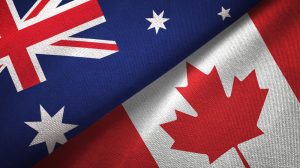Canada and Australia can be viewed as something like strategic cousins: similar in many respects but not necessarily that close or familiar with each other. That closeness has ebbed and flowed over time; is it about to ebb once again?
A diplomatic vacancy is appearing on the horizon. The current Australian High Commissioner in Canada, Her Excellency Natasha Smith, ends her term in early 2022, at which point a timely opportunity to deepen cooperation between the two middle powers will present itself.
Canadian-Australian cooperation has proceeded unevenly over time, but as mentioned above, they share many similarities. The nations are both bicameral federal parliamentary democratic New World countries with comparable histories and many points of worthy comparison. They are partners in the Five Eyes intelligence arrangements, which implies a range of modest and discrete but significant ties. Diplomatically, at times they have been competitors, particularly over trade, as both have similar export-focused economies.
In security terms, though, Australia and Canada are traditional and close partners, a history that ranges from sharing battle honors under generals Monash and Currie during the breakthrough Battle of Amiens on August 8, 1918 – the so-called Black Day of the German Army – to sharing the travails of captivity during the Pacific War, Australians largely in Singapore’s prisons and Canadians in Hong Kong’s. It also includes operating alongside one another in the Korean War, on numerous global peacekeeping and humanitarian assistance missions, and again in Afghanistan after 2001.
Those times are behind us now. One might argue that we should not let sentimental reflection over shared past travails drive future policy decisions today. But with the post-Cold War unipolar moment having passed, these two remarkably similar New World democracies face similar challenges and difficult choices. Formulating responses to the issues relating to great power contestation, looming environmental catastrophe, and a full spectrum of governance challenges warrant closer collaboration between these two broadly like-minded liberal democracies and free market economies.
The United States’ transactional retreat from ideational leadership in recent years has made middle powers like Australia and Canada worried and vulnerable. Such countries rely on the international institutions that the previous U.S. administration denigrated and walked away from, and with which the Biden administration remains inconsistently engaged: the Comprehensive and Progressive Agreement for Trans-Pacific Partnership trade pact being a prime example. Today, what these nations face is not so much a new Cold War as a more complicated strategic environment that, depending on the issue and the time, fluctuates between cooperation, competition, contestation, and conflict.
As readers will be aware, Beijing has been acting along the contestation and conflict end of that spectrum and has reserved some of its harshest treatment for Australia, with unilateral trade strikes, the arbitrary arrest of Australian citizens, and ham-fisted attempts to sway Australian public opinion, all of which have seen the Canberra-Beijing relationship enter a deep freeze.
Similarly, the Trudeau government has had its feet held to the fire by Beijing in recent years. So much so, it featured as a prominent issue at this year’s election. The latest episode concluded with the release of Canadians Michael Kovrig and Michael Spavor after their imprisonment for more than 1,000 days, ostensibly in exchange for “Huawei princess” Meng Wanzhou.
While some have argued that Meng’s release is a “significant move and symbolizes a new beginning for China and the U.S.,” this is very wrong. Such a period defined by quid pro quo deals would represent dark days for middle powers like Australia and Canada.
There is a reason why Beijing prefers bilateral negotiations: its size and power places it in a position of greater power. If isolated, both Australia and Canada stand to lose. Their mutual ally, the U.S., recognizes this reality. Secretary of State Antony Blinken told the media earlier this year that “the U.S. will not leave Australia alone on the field in the face of economic coercion by China.”
Both Australia and Canada will benefit from greater synergy across a range of foreign policy issues. Collective resistance is the core way that middle powers can resist Beijing’s growing belligerence.
It is for these reasons that the next appointment in Ottawa is vitally important for deepening cooperation in a way not seen in decades. Therefore, it should not be a surprise if a less traditional appointee is being considered in order to strengthen political ties. Prime Minister Scott Morrison’s government has not been shy of making political appointees, and Senator Scott Ryan’s name has been rumored for the post. While political appointments have been criticized by some, the counter-argument is that former politicians provide unique capabilities that can be valuable in a changing diplomatic landscape that places a growing emphasis on an ability to have immediate and high-level access at home and abroad.
Frances Adamson, the former secretary of the Department of Foreign Affairs and Trade (DFAT), once stated that Australia is a “top ten diplomatic service.” Whoever is Australia’s next high commissioner in Ottawa, they will be supported by some of Australia’s best and brightest and the immediate priority should be how to deepen the relationship between the two nations. The mutual spectrum of challenges should provide a firm basis for commonality, ensuring that Australia’s mission in Ottawa captures increasing amounts of attention back in Canberra.

































